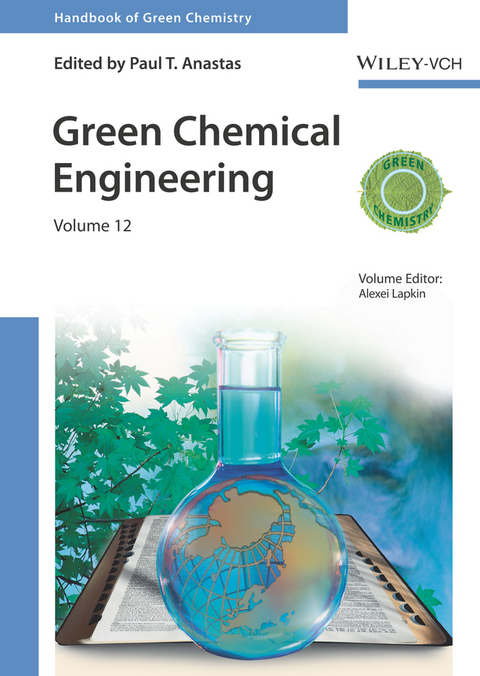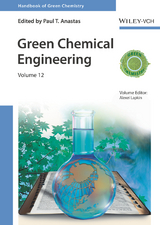Handbook of Green Chemistry - Green Chemical Engineering
Wiley-VCH (Verlag)
978-3-527-32643-3 (ISBN)
Written by an international team of specialists with each section edited by international leading experts, this book provides first-hand insights into the field, covering chemical engineering process design, innovations in unit operations and manufacturing, biorefining and much more besides.
An indispensable source for every chemical engineer in industry and academia.
Paul T. Anastas joined Yale University as Professor and serves as the Director of the Center for Green Chemistry and Green Engineering at Yale. From 2004-2006, Paul Anastas has been the Director of the Green Chemistry Institute in Washington, D.C. Until June of 2004 he served as Assistant Director for Environment at e White House Office of Science and Technology Policy where his responsibilities included a wide range of environmental science issues including furthering international public-private cooperation in areas of Science for Sustainability such as Green Chemistry. In 1991, he established the industry-government-university partnership Green Chemistry Program, which was expanded to include basic research, and the Presidential Green Chemistry Challenge Awards. He has published and edited several books in the field of Green Chemistry and one of the inventors of the 12 principles of Green Chemistry.
Alexei Lapkin is Professor of Sustainable Reaction Engineering at the Univeristy of Cambridge. He received his PhD in Chemical Engineering at the University of Bath in 2000 and held a Lecturer position until 2009. He then moved to University of Warwick, School of Engineering, to help to develop their research programme in Chemical Engineering. In 2013 he took over his position in Cambridge.
PERSPECTIVE ON CHEMICAL ENGINEERING SCIENCE AND GREEN CHEMISTRY
MOLECULAR ENGINEERING OF MATERIALS, REACTIONS AND PROCESSES
Engineering of solvents and reactivity
Design and applications of functional nanomaterials
First principles design of functional materials
Bio-nano interface
Chemical biology for reaction design
CHEMICAL ENGINEERING PROCESS DESIGN
Conceptual Process Design
Global Process Optimisation
INNOVATIONS IN UNIT OPERATIONS AND MANUFACTURING
Advanced Catalytic Processes Technology
Incorporation of Process Intensification in Unit operations design and complete processes
Distributed Manufacturing of Chemicals / Chemical Leasing
Rapid prototyping technology
BIOCHEMICAL PROCESSES AND BIOREFINING
Integration of bio and chemical processes in biorefining
Separations in biorefining
State of the art of large-scale fermentation
ENABLING TECHNOLOGIES
Reaction monitoring, Sensors
Reactor tomography
Real-time Process Control and Optimisation
Real-time reaction optimisation
SUSTAINABLE CHEMICAL ENGINEERING CONCLUDING REMARKS
| Erscheint lt. Verlag | 1.8.2018 |
|---|---|
| Mitarbeit |
Herausgeber (Serie): Paul T. Anastas |
| Verlagsort | Berlin |
| Sprache | englisch |
| Maße | 170 x 240 mm |
| Gewicht | 924 g |
| Einbandart | gebunden |
| Themenwelt | Naturwissenschaften ► Chemie |
| Technik ► Umwelttechnik / Biotechnologie | |
| Schlagworte | Biochemie • chemical engineering • Chemie • Chemische Verfahrenstechnik • Chemistry • Industrial Chemistry • Industrielle Chemie • Nachhaltige u. Grüne Chemie • Nachhaltigkeit • Process Engineering • Prozesssteuerung • Sustainable Chemistry & Green Chemistry • Technische Chemie • Technische u. Industrielle Chemie • Umweltfreundliche Technologie |
| ISBN-10 | 3-527-32643-X / 352732643X |
| ISBN-13 | 978-3-527-32643-3 / 9783527326433 |
| Zustand | Neuware |
| Informationen gemäß Produktsicherheitsverordnung (GPSR) | |
| Haben Sie eine Frage zum Produkt? |
aus dem Bereich





